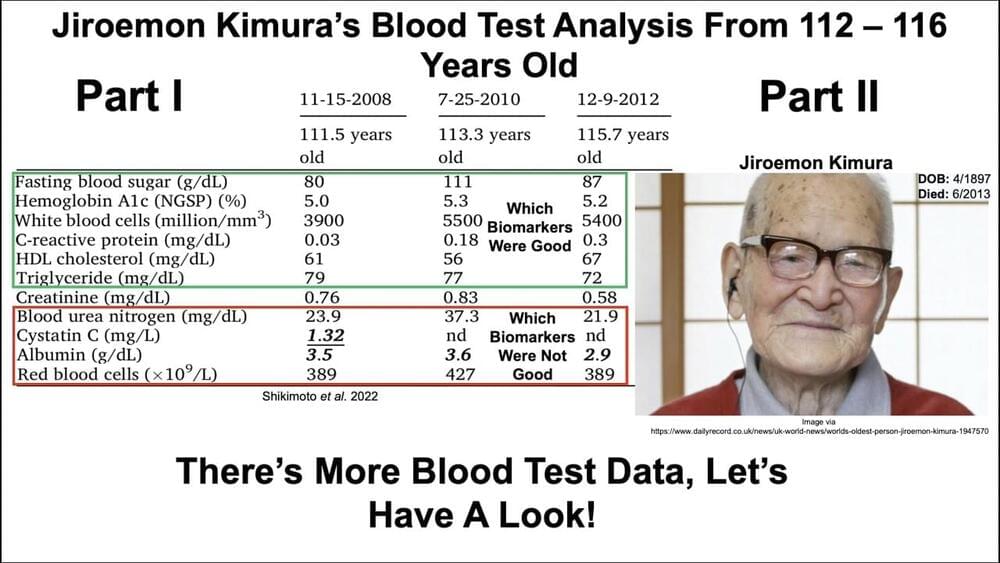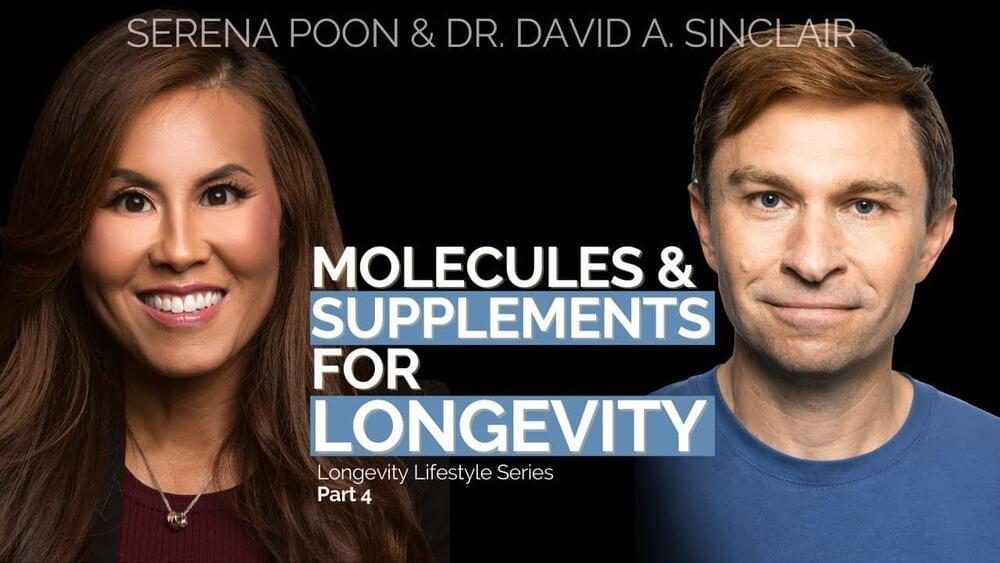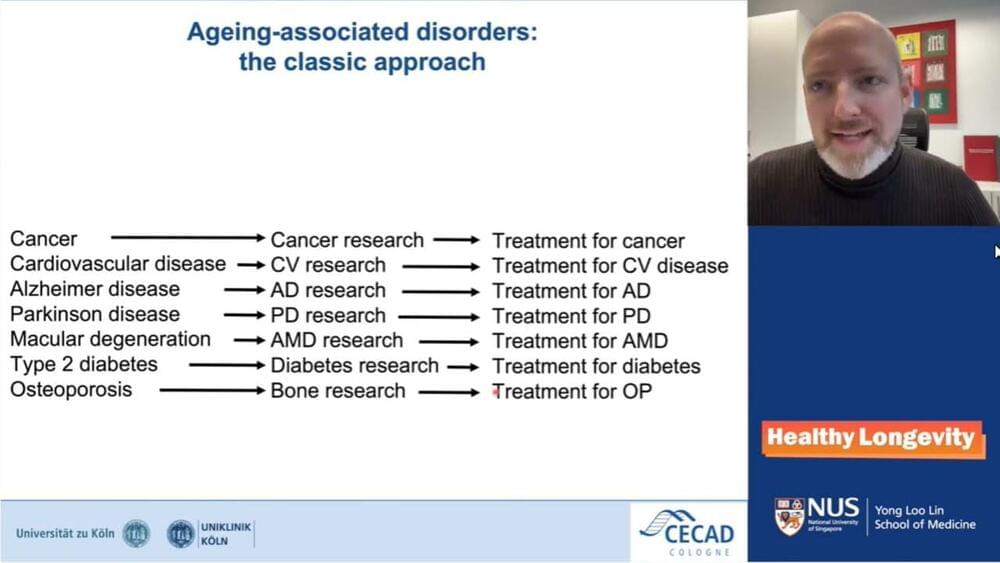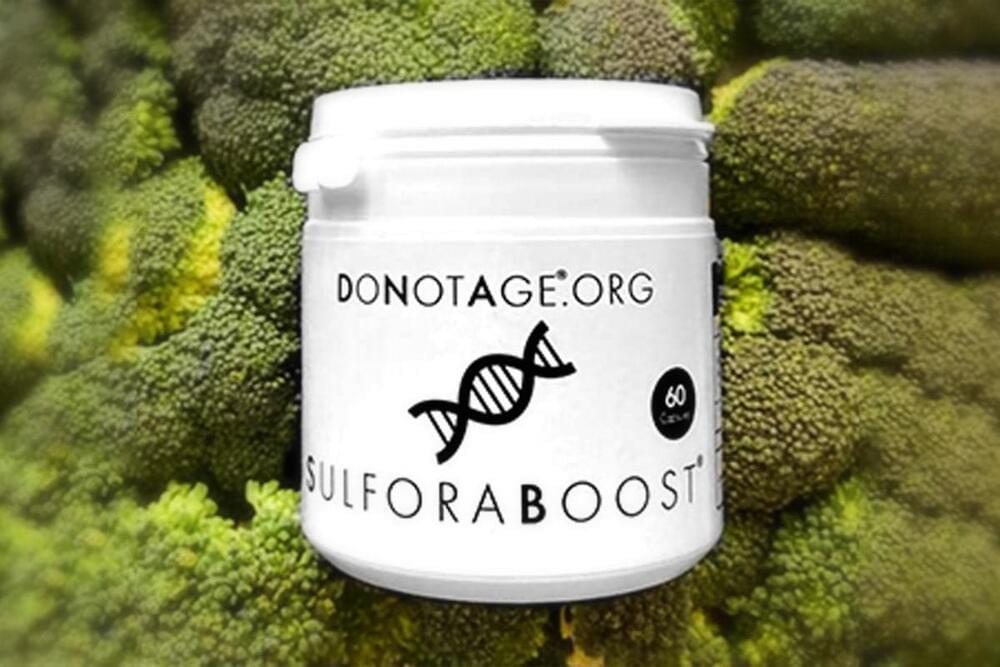Archive for the ‘life extension’ category: Page 203
Feb 14, 2022
The Dog Aging Project Will Study Longevity in 60,000 Pups
Posted by Kelvin Dafiaghor in category: life extension
Our furry friends are about to fetch new answers to the tough problem of longevity.
The Dog Aging Project (DAP), launched in 2018, is recruiting tens of thousands of loyal canine companions for a comprehensive study. The open-sourced collaborative project, expected to last ten years, has ambitious goals: tackle the thorny problem of what contributes to aging, and test ways to prolong healthy longevity.
Aside from its massive scale—it’s the largest data-gathering program of its kind—the project stands out in that it eschews the usual method of using lab animals, grown in carefully-controlled environments and often inbred. Instead, DAP is recruiting dogs from across the country, with a smorgasbord of breeds, ages, and environments.
Feb 13, 2022
(Part II) Supercentenarian (112 — 116y) Blood Test Analysis
Posted by Mike Lustgarten in categories: biotech/medical, chemistry, life extension, robotics/AI

Join us on Patreon!
https://www.patreon.com/MichaelLustgartenPhD
Papers referenced in the video:
Main study:
Clinical course of the longest-lived man in the world: A case report.
https://pubmed.ncbi.nlm.nih.gov/34973348/
Continue reading “(Part II) Supercentenarian (112 — 116y) Blood Test Analysis” »
Feb 12, 2022
New longevity supplement leverages plant power of sulforaphane
Posted by Genevieve Klien in category: life extension
Taking a leaf out of Mother Nature’s book could improve lifespan and healthspan. Brand-new sulforaphane longevity supplement launches.
Feb 12, 2022
Could we really live forever as a chatbot or a hologram?
Posted by Shubham Ghosh Roy in categories: holograms, life extension, robotics/AI, virtual reality
Feb 12, 2022
Longevity Molecules and Supplements | Longevity Lifestyle Series P4 | Serena Poon Dr. David Sinclair
Posted by Montie Adkins in categories: biotech/medical, food, life extension

Do you have a longevity supplement stack? I do not at this time but this might help you. Interesting that Sinclair takes C60 but I heard that was not good for you. This video is annotated with many chapters.
In Part Four of our Instagram LIVE super series, @David Sinclair & I chat about molecules and supplements for longevity! Our hope is that you come away from this conversation with tangible tips and an understanding of how these types of supplements can maximize longevity.
Feb 12, 2022
Vitalik Buterin on Ethereum and immortality
Posted by Kelvin Dafiaghor in categories: biological, blockchains, cryptocurrencies, life extension, security

In this episode of UpOnly, the creator of Ethereum Vitalik Buterin talks origin stories, his motivation, the future of Ethereum, and even biological sciences.
Presented by FTX: https://uponyl.tv/ftx.
Continue reading “Vitalik Buterin on Ethereum and immortality” »
Feb 11, 2022
Prof. Bjoern Schumacher on why aging should be treated as a disease | S/T en Español
Posted by Andrés Grases in categories: biotech/medical, life extension

Prof Bjoern Schumacher, Director of The Institute for Genome Stability in Ageing and Diseases at The University of Cologne, shortly explains the reasons and the benefits healthcare systems will attain by shifting their focus from treating each individual age related diseases in the elderly into treating aging as a disease.
To watch his entire intervention during a webinar organized by Brian Kennedy from the National University of Singapore (NUS), clic here: https://youtu.be/I4Kqp3xRiuw
Feb 11, 2022
Hypoint opens UK hydrogen cell development unit to power eVTOL and other aircraft
Posted by Shubham Ghosh Roy in categories: chemistry, drones, life extension

Silicon Valley hydrogen fuel cell innovator Hypoint has inaugurated a new UK unit intended to speed development of its air-cooled aviation power technology, and ready it to supply zero-carbon power to next-generation aircraft like electric takeoff and landing vehicles (eVTOL) as they prepare to launch services.
HyPoint’s tech uses compressed air for both cooling and oxygen supplies delivered to its fuel systems, which are lighter, less polluting, have longer lifespans, and enable seven times more flight capacity than lithium-ion and other chemical batteries. Those attributes are luring developers of existing, new drone, and eVTOL craft to give emerging hydrogen cell products serious consideration as drivers of their vehicles – especially as the world seeks to reduce its carbon output. In 2018, aviation sector’s share of global CO2 emissions was 2.5%.
Feb 10, 2022
How AI And Aging Research Can Help Life Insurance Companies?
Posted by Gemechu Taye in categories: biotech/medical, life extension, robotics/AI
The recent advances in machine learning and artificial intelligence, coupled with increases in computational power, have led to a lot of interest and hype in longevity biotechnology 30114–2). Hundreds of data scientists and companies are taking advantage of this hype to propel research and discovery of new technologies in aging research.
One of the major new areas in aging research are biomarkers of aging that give the true biological age of humans that may be different from their chronological age. One of the most advanced biomarkers of aging are deep aging clocks that can help researchers predict biological age as well as mortality of humans. In 2013, Steven Horvath published an article called ‘DNA methylation age of human tissues and cell types,’ in which he outlined the development of a multi-tissue predictor of age that allows for the estimation of the DNA methylation age of most tissues and cell types. He also formed an aging clock that can be used to address questions in developmental biology, cancer, and aging research.
There have been several more studies on such clocks since 2013. For example, I was part of a team in 2016 and we published a study on the first deep aging clock titled ‘Deep biomarkers of human aging: Application of deep neural networks to biomarker development.’ Since our study was published, many other aging clocks that can predict age as well as mortality rapidly entered into many industries. it is clear that there is a boom in the longevity biotechnology industry and huge progress in aging research is expected to be made in the next few years. AI-based aging clocks provide a very good entry point for the insurance companies to get into the field of aging research and actually contribute while protecting their business and innovating in science and technology.













